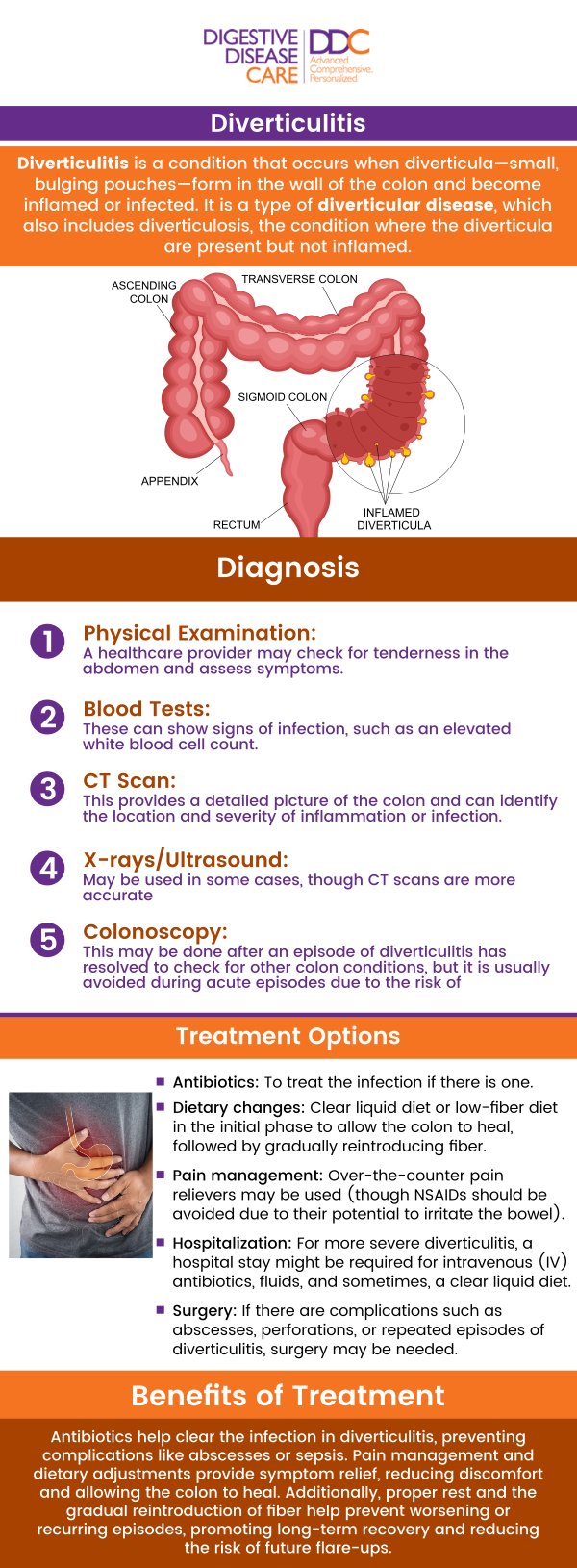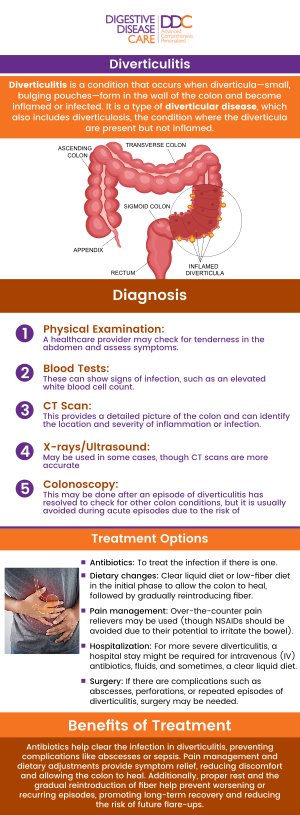Symptoms of Diverticulitis in Females
Symptoms of diverticulitis in females often include persistent lower abdominal pain, bloating, nausea, fever, and changes in bowel habits. These symptoms may vary in intensity depending on the severity of inflammation. At Digestive Disease Care, Dr. Preeti Mehta, MD, and our team of board-certified gastroenterologists provide thorough evaluation and personalized treatment to help women manage symptoms effectively and improve digestive health. For more information, please contact us or book an appointment online. We have convenient locations to serve you in Babylon NY, East Setauket NY, Forest Hills NY, Jericho NY, Lake Success NY, Melville NY, Mineola NY, Massapequa NY, New Hyde Park NY and Riverhead NY.


Table of Contents:
What are the common symptoms of diverticulitis in females?
Can diverticulitis cause abdominal pain in women?
How does diverticulitis affect women differently from men?
What lifestyle factors can trigger diverticulitis symptoms in females?
Dr. Preeti Mehta’s Approach to Managing Diverticulitis Symptoms in Female Patients
Diverticulitis occurs when small pouches (diverticula) in the lining of the colon become inflamed or infected, leading to abdominal discomfort and digestive changes. While symptoms can occur in both men and women, females may experience specific patterns influenced by hormonal or anatomical differences. Recognizing early signs can help prevent complications and the need for hospitalization.
Common symptoms of diverticulitis in females include:
• Persistent pain, usually in the lower left side of the abdomen
• Bloating, gas, or abdominal tenderness that worsens after meals
• Changes in bowel habits, such as constipation or diarrhea
• Nausea and vomiting due to intestinal inflammation
• Fever and chills indicate infection
• Loss of appetite and fatigue
• Pain during urination or urinary frequency (in severe cases)
• Blood in the stool or rectal bleeding
Prompt medical attention is essential if these symptoms occur, as untreated diverticulitis can lead to abscess formation, bowel obstruction, or perforation. Early diagnosis allows for conservative management through diet and rest, while severe cases may require antibiotics or surgical intervention. Regular screenings and a fiber-rich diet can help reduce recurrence and support digestive health.
Diverticulitis can indeed cause abdominal pain in women, as it involves inflammation or infection of small pouches (diverticula) that form in the colon wall. This condition often leads to discomfort that can range from mild cramping to severe, persistent pain, depending on the extent of inflammation. Women, especially those over 40, may notice symptoms more prominently due to changes in digestion, diet, or hormonal fluctuations that affect bowel habits.
Common symptoms of abdominal pain caused by diverticulitis in women include:
• Sharp or constant pain, often in the lower left side of the abdomen
• Abdominal tenderness that worsens with movement or pressure
• Bloating and feelings of fullness after eating
• Nausea, vomiting, or loss of appetite
• Constipation or changes in bowel movements
• Fever and chills if infection develops
• Cramping or dull ache that persists for several days
• Pain that radiates to the back or pelvis in severe cases
If a woman experiences these symptoms, it’s important to seek medical evaluation promptly. Early diagnosis helps prevent complications such as abscesses or perforations. A balanced diet rich in fiber, proper hydration, and regular medical monitoring can help manage symptoms and reduce the risk of recurrent diverticulitis flare-ups.
Diverticulitis can affect women differently from men due to hormonal, anatomical, and lifestyle factors. While both genders experience inflammation of the colon’s diverticula, women may have unique patterns of pain and symptoms influenced by hormonal changes and pelvic structure.
Below are the main ways diverticulitis affects women differently:
• Hormonal Influence: Changes in estrogen levels, especially after menopause, can slow digestion and increase the risk of inflammation.
• Pelvic Anatomy: The female pelvic structure, including the uterus and bladder, lies close to the colon, which may lead to pelvic pressure or urinary discomfort during diverticulitis flare-ups.
• Symptom Variation: Women often report bloating, cramping, or pain that spreads to the lower back or hips, which may resemble gynecologic conditions like endometriosis or ovarian cysts.
• Misdiagnosis Potential: Because symptoms overlap with female reproductive issues, diverticulitis in women can sometimes be mistaken for pelvic inflammatory disease or other gynecological problems.
• Urinary Symptoms: Inflammation near the bladder can cause urinary urgency, burning, or discomfort, which is more common in women than men.
• Digestive Changes: Women are more prone to constipation due to hormonal changes and lower fiber intake, increasing the risk of diverticula formation and flare-ups.
• Emotional and Stress Factors: Hormonal fluctuations and stress can affect digestion, possibly triggering symptoms or worsening pain.
• Postmenopausal Risks: Reduced estrogen after menopause may weaken intestinal wall integrity, making women more susceptible to diverticular disease.
• Recurrence Rate: Women, particularly those over 50, may experience chronic or recurrent diverticulitis more often than men.
• Prevention and Management: A high-fiber diet, proper hydration, and regular medical follow-ups help minimize flare-ups and promote gut health in women.
Lifestyle factors play a major role in triggering diverticulitis symptoms in females. Certain daily habits, diet choices, and stress levels can increase inflammation and digestive discomfort.
Below are common factors that may contribute to flare-ups:
• Low-Fiber Diet: Eating too little fiber can lead to constipation and pressure in the colon, increasing the risk of inflammation in diverticula.
• Dehydration: Not drinking enough water slows digestion, causing harder stools and straining during bowel movements.
• Sedentary Lifestyle: Lack of physical activity weakens intestinal muscles, reducing bowel movement efficiency and increasing risk of flare-ups.
• High Intake of Processed Foods: Diets rich in refined grains, fried foods, and red meat can cause inflammation and poor colon health.
• Skipping Meals or Irregular Eating: Inconsistent eating patterns can disrupt digestion and contribute to abdominal discomfort.
• Obesity: Excess abdominal fat increases pressure on the colon and is linked to higher rates of diverticulitis.
• Stress: Chronic stress affects gut motility and immune response, often leading to worsening symptoms or flare-ups.
• Smoking: Tobacco use reduces blood flow to the intestines and slows healing, raising the risk of recurrent inflammation.
• Excess Alcohol or Caffeine: Overconsumption can irritate the digestive tract, leading to dehydration and cramping.
• Poor Bowel Habits: Ignoring the urge to have a bowel movement or straining can increase pressure inside the colon.
• Hormonal Changes: Menstrual cycles or menopause-related shifts may slow bowel movements, worsening constipation and discomfort.
• Lack of Probiotics: Not consuming gut-friendly foods like yogurt or fermented products can disrupt healthy gut bacteria balance.
Maintaining a high-fiber diet, staying hydrated, managing stress, and exercising regularly can help prevent diverticulitis flare-ups in females and support overall digestive health.
Dr. Preeti Mehta, MD, takes a patient-centered approach to managing diverticulitis symptoms in female patients, focusing on accurate diagnosis, personalized treatment, and long-term prevention. Understanding that women may experience unique challenges due to hormonal fluctuations, digestive sensitivity, and pelvic anatomy, Dr. Preeti Mehta, MD, tailors her care to address these individual differences. Her management strategy begins with a comprehensive evaluation that may include a colonoscopy, imaging, and dietary assessment to identify the severity and triggers of inflammation. She emphasizes lifestyle modifications such as increasing fiber intake, maintaining hydration, and incorporating gentle physical activity to promote colon health. Dr. Preeti Mehta frequently sees patients for abdominal pain, colonoscopy, gastroenterology consultations, hemorrhoids, and a wide range of digestive illnesses, allowing her to apply a holistic understanding of the gastrointestinal system to each patient’s care.
Dr. Preeti Mehta, MD, provides 5-star healthcare services and is highly rated within the New York community for her compassionate, evidence-based care. She combines her extensive clinical experience with advanced procedural skills to ensure that every patient receives the most effective and minimally invasive treatment possible. Her approach to diverticulitis management also includes education and ongoing monitoring to help female patients recognize early warning signs, prevent recurrences, and maintain long-term digestive wellness. With a strong commitment to patient comfort and trust, Dr. Mehta continues to set a standard of excellence in gastroenterology through her dedication, precision, and personalized attention to every individual she treats. For more information, please contact us or book an appointment online. We have convenient locations to serve you in Babylon NY, East Setauket NY, Forest Hills NY, Jericho NY, Lake Success NY, Melville NY, Mineola NY, Massapequa NY, New Hyde Park NY and Riverhead NY.

Check Out Our 5 Star Reviews


Additional Services You May Like

Additional Services You May Like
- Abdominal Pain
- Acid Reflux
- Barretts Esophagus
- Bloating
- Capsule Endoscopy
- Celiac Disease
- Colon Cancer Screening
- Colonoscopy
- Constipation
- Crohns Disease
- Diarrhea
- Diverticulitis
- Esophageal PH Monitoring
- Fatty Liver
- Fibroscan
- Gallstones
- Gastroenterologist
- Gastric Chest Pain
- Gluten Intolerance
- Hemorrhoid
- Hemorrhoid Banding
- Hepatitis
- Irritable Bowel Syndrome
- Lactose Intolerance
- Pancreatitis
- Polyps
- Rectal Bleeding
- Stomach
- Ulcerative Colitis
- GI Urgent Care





